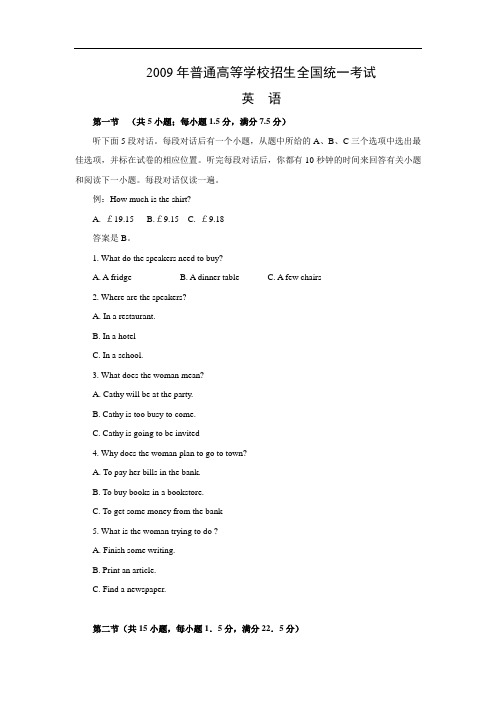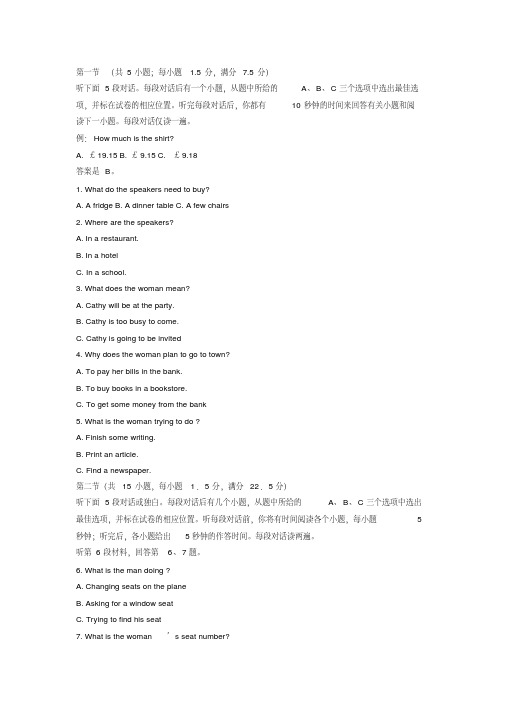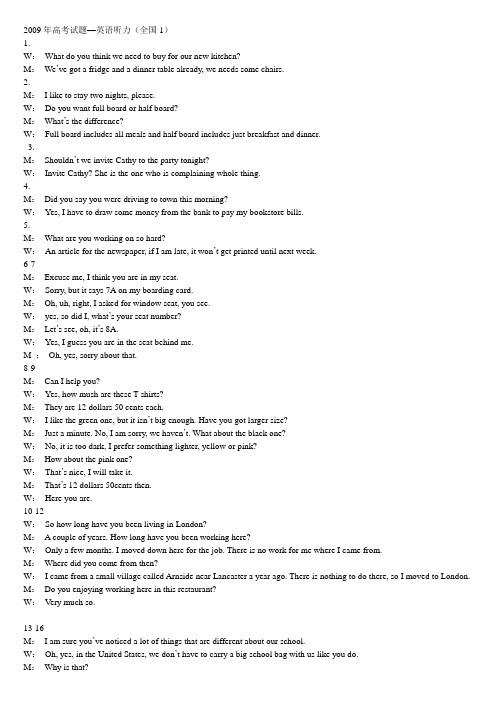2009年全国高考北京市英语听力
[vip专享]2009高考英语北京卷
![[vip专享]2009高考英语北京卷](https://img.taocdn.com/s3/m/7493b68dfc4ffe473268ab8f.png)
2009年普通高校招生统一考试北京卷(英语)(满分150分,时间120分钟) 第I卷(选择题,共115分)第一部分听力理解(共两节,30分)第一节(共5小题;每小题1.5分,共7.5分)听下面5段对话。
每段对话后有一道小题。
从每题所给的A、B、C三个选项中选出最佳选项。
听完每段对话后,你将有10秒钟时间来回答有关小题和阅读下一小题。
每段对话你将听一遍。
例:What is the man going to read?A. A newspaper.B. A magazine.C. A book.答案是A。
1. How fast can the woman type?A.15 words a minute.B.45 words a minute.C.80 words a minute.2. Which program does the man like most?A. Sports.B. History.C. News.3. Which language does Mr. White speak well?A. French.B. Spanish.C. Japanese.4. What was in the woman’s missing bag?5. Where does the conversation probably take place?A. In a classroom.B. In a library.C. In a bookstore.第二节(共15小题;每小题1.5分,共22.5分)听下面6段对话或独白。
每段对话或独白后有几道小题,从每题所给的A、B、C三个选项中选出最佳选项。
听每段对话或独白前,你将有5秒钟的时间阅读每小题。
听完后,每小题将给出5秒钟的做答时间。
每段对话或独白你将听两遍。
听第6段材料,回答第6至7题。
6. What’s wrong with the man?A. He has headaches.B. He has a runny nose.C. He has a temperature.7. When did the problem begin?A. Two weeks ago.B. Two months ago.C. Three months ago.听第7段材料,回答第8至9题。
2009年高考北京英语试题及参考答案

2009年高考北京英语试题及参考答案2009年普通高等学校招生全国统一考试(北京卷)英语本试卷分第Ⅰ卷(选择题)和第Ⅱ卷(非选择题)两部分, 第Ⅰ卷1至14页, 第Ⅱ卷15至16页, 共150分, 考试时间120分钟。
考试结束后, 将本试卷和答题卡一并交回。
注意事项:1. 考生务必将答案答在答题卡上, 在试卷上作答无效。
2. 答题前考生务必将答题卡上的姓名、准考证号用黑色字迹的签字笔填写, 用2B铅笔将准考证号对应的信息涂黑。
3. 答题卡第Ⅰ卷必须用2B铅笔作答, 将选中项涂满涂黑, 黑度以盖住框内字母为准, 修改时用橡皮擦除干净。
第Ⅱ卷必须用黑色字迹的签字笔按照题号顺序在各题目的答题区域内作答, 未在对应的答题区域内作答或超出答题区域作答均不得分。
第Ⅰ卷(选择题共115分)第一部分: 听力理解(共两节, 30分)第一节(共5小题, 每小题1. 5分, 共7. 5分)听下面5段对话。
每段对话后有一道小题, 从每题所给的A、B、C三个选项中选出最佳选项。
听完每段对话后, 你将有10秒钟的时间来回答有关小题和阅读下一小题。
每段对话你将听一遍。
例: What is the man going to read?A. A newspaperB. A magzineC. A book答案是A。
1. How fast does the woman type?A. 15 words a minuteB. 45 words a minuteC. 80 words a minute2. Which program does the man like most?A. SportsB. HistoryC. News3. Which language does Mr. White speak well?A. FrenchB. SpanishC. Japanese4. What was in the woman's missing bag?5. Where does the conversation probably take place?A. In a classroom.B. In a libraryC. In a bookstore第二节(共15小题;每小题1. 5分, 共22. 5分)听下面6段对话或独白。
2009年全国高考北京英语试题答案

2009年普通高等学校招生全国统一考试英语(北京卷)答案第一部分:听力理解(共两节,30分)第一节(共5小题,第小题1.5分共7.5分)1.C2.A3.B4.B5.C第二节(共15小题,每小题1.5分,共22.5分)6.A7.C8.A9.C 10.B 11.B 12.C 13.B 14.B 15.C 16.A 17.A 18.B 19A .20.C第二部分:知识运用(共两节,45分)第一节单项填空(共15小题,每小题1分,共15分)21.C 22.B 23.A 24.A 25.D 26.A 27.B 28.D 29.C 30.C 31.D 32.B 33.D 34.B 35.A第二节完形填空(共20小题,每小题1.5分,共30分)36.C 37.A 38.D 39.B 40.A 41.C 42.B 43.D 44.C 45.A 46.D 47.B 48.C 49.B 50.A 51.D 52.B 53.D 54.A 55.C第三部分:阅读理解(共20小题,每小题2分,共40分)56.C 57.B 58.C 59.D 60.D 61.D 62.C 63.B 64.B 65.A 66.D 67.C 68.A 69.B 70.A 71.A 72.A 73.B 74.C 75.D第四部分:书面表达(共两节,35分)第一节情景作文(20分)一、内容要点:1、骑车去植树2、植树3、安插提示牌4、照相二、说明:内容要点可用不同方式表达三、One possible version:Green Action in Our ClassApril 12 is memorable because our class had a meaningful experience on that day. In the morning, we bicycled to the suburbs to plant trees, talking and laughing all the way. Upon arrival, we began to work immediately. Some were digging holes. Some were carrying and planting young trees. Others were watering them. After getting the work done, we put up a board reminding people to protect the trees. Before leaving we took some photos to record our green action. Seeing the lines of trees, we all had a sense of achievement. We feel it’s our duty t o protect and beautify our environment.第二节开放作文(15分)One possible version:What an interesting picture! A Western young man, sitting at a table, is ready to eat a bowl of noodles. He is holding two forks the same way as we Chinese hold chopsticks. He is trying so hard to pick up the noodles that he is sweating a lot. At first glance, I think it’s abit funny, for we Chinese take for granted that chopsticks are the tools for eating noodles. The man in the picture is trying to copy us. Obviously he is doing it the hard way. Maybe using one fork will do a better job, In my opinion, we don’t need to copy others’ ways of thinking. Sometimes a simpler way of doing things may be a better way.2009年普通高等学校招生全国统一考试英语(北京卷)答案第一部分:听力理解(共两节,30分)第一节(共5小题,第小题1.5分共7.5分)1.C2.A3.B4.B5.C第二节(共15小题,每小题1.5分,共22.5分)6.A7.C8.A9.C 10.B 11.B 12.C 13.B 14.B 15.C 16.A 17.A 18.B 19A .20.C第二部分:知识运用(共两节,45分)第一节单项填空(共15小题,每小题1分,共15分)21.C 22.B 23.A 24.A 25.D 26.A 27.B 28.D 29.C 30.C 31.D 32.B 33.D 34.B 35.A第二节完形填空(共20小题,每小题1.5分,共30分)36.C 37.A 38.D 39.B 40.A 41.C 42.B 43.D 44.C 45.A 46.D 47.B 48.C 49.B 50.A 51.D 52.B 53.D 54.A 55.C第三部分:阅读理解(共20小题,每小题2分,共40分)56.C 57.B 58.C 59.D 60.D 61.D 62.C 63.B 64.B 65.A 66.D 67.C 68.A 69.B 70.A 71.A 72.A 73.B 74.C 75.D第四部分:书面表达(共两节,35分)第一节情景作文(20分)一、内容要点:1、骑车去植树2、植树3、安插提示牌4、照相二、说明:内容要点可用不同方式表达三、One possible version:Green Action in Our ClassApril 12 is memorable because our class had a meaningful experience on that day. In the morning, we bicycled to the suburbs to plant trees, talking and laughing all the way. Upon arrival, we began to work immediately. Some were digging holes. Some were carrying and planting young trees. Others were watering them. After getting the work done, we put up a board reminding people to protect the trees. Before leaving we took some photos to record our green action. Seeing the lines of trees, we all had a sense of achievement. We feel it’s our duty to pr otect and beautify our environment.第二节开放作文(15分)One possible version:What an interesting picture! A Western young man, sitting at a table, is ready to eat a bowl of noodles. He is holding two forks the same way as we Chinese hold chopsticks. He istr ying so hard to pick up the noodles that he is sweating a lot. At first glance, I think it’s a bit funny, for we Chinese take for granted that chopsticks are the tools for eating noodles. The man in the picture is trying to copy us. Obviously he is doing it the hard way. Maybe using one fork will do a better job, In my opinion, we don’t need to copy others’ ways of thinking. Sometimes a simpler way of doing things may be a better way.。
2009年高考试题—英语听力(北京卷)

2009年普通高等学校招生全国统一考试(北京卷)英语第I卷(选择题共115)第一部分:听力理解(共两节,30分)第一节(共5小题;每小题1.5分,共7.5分)听下面5段对话,每段对话后有一道小题,丛每题所给的A,B,C三个选项中选出最佳选项,听完每段对话后,你将有10秒钟的时间来回答有关小题和阅读下一小题,每段对话你将听一遍。
例:What is the man going to read?A,,A newspaperB ,AmagazineC ,A book答案是A.1.How fast can the woman type?A.15words a minute .B. 45rds a minute .C. 80rds a minute .2. Which program does the man like most?A.Sports .B.History .C.News .3.Which language does Mr .White speak well?A.FrenchB.SpanishC.Japanese4.What was in the woman’s missing bag?5. Where does the conversation probably take place?A.In a classroomB.In a libraryC.In a bookstore第二节(共15小题:每小题1.5分,共22.5分)听下面6段对话或独白,每段对白或独白后有几道小题,从每题所给的A、B、C三个选项中选出最佳选项。
听每段对白或独白前,你将有5秒种的时间阅读每小题。
听完后,每小题将给出5秒钟的做答时间。
每段对话或独白你将听两遍。
听每6段材料,回答第6至7题。
6.What’s wrong with the man?A.He has headaches.B. He has a runny nose.C. He has a temperatute.7. When did the problem begin?A. Two weeks ago.B. Two momths ago.A. Threee momths ago.听第7段材料,回答8至9题8 .Why did the woman make the phone call?A To change her appointment.B To discuss a business plan.C To arrange an exhibition.9. when are they going to meet?A WednesdayB ThursdayC Friday听第8段材料,回答第10—11题。
2009年高考英语听力(全国卷)

2009年普通高等学校招生全国统一考试英语第一节(共5小题;每小题1.5分,满分7.5分)听下面5段对话。
每段对话后有一个小题,从题中所给的A、B、C三个选项中选出最佳选项,并标在试卷的相应位置。
听完每段对话后,你都有10秒钟的时间来回答有关小题和阅读下一小题。
每段对话仅读一遍。
例:How much is the shirt?A. £19.15B.£9.15C. £9.18答案是B。
1. What do the speakers need to buy?A. A fridgeB. A dinner tableC. A few chairs2. Where are the speakers?A. In a restaurant.B. In a hotelC. In a school.3. What does the woman mean?A. Cathy will be at the party.B. Cathy is too busy to come.C. Cathy is going to be invited4. Why does the woman plan to go to town?A. To pay her bills in the bank.B. To buy books in a bookstore.C. To get some money from the bank5. What is the woman trying to do ?A. Finish some writing.B. Print an article.C. Find a newspaper.第二节(共15小题,每小题1.5分,满分22.5分)听下面5段对话或独白。
每段对话后有几个小题,从题中所给的A、B、C三个选项中选出最佳选项,并标在试卷的相应位置。
听每段对话前,你将有时间阅读各个小题,每小题5秒钟;听完后,各小题给出5秒钟的作答时间。
2009年高考英语试卷听力+原文+答案(全国卷Ⅰ、Ⅱ)

2009年全国统一高考英语试卷(全国卷I)听力试题第一部分听力(共两节,满分30分)做题时,先将答案标在试卷上,录音结束后,你将有两分钟的时间将试卷上的答案转涂到答题卡上。
第一节(共5小题,每小题1.5分,满分7.5分)听下面5段对话。
每段对话后有一个小题,从题中所给的A、B、C三个选项中选出最佳答案。
听完每段对话后,你都有10秒钟的时间来回答有关小题和阅读下一小题。
每段对话仅读一遍。
例: How much is the shirt?A. £ 19.15.B. £9.18.C. £9.15.答案是C.1. What do the speakers need to buy?A. A fridge.B. A dinner table.C. A few chairs.2. Where are the speakers?A. In a restaurant.B. In a hotel.C. In a school.3. What does the woman mean?A. Cathy will be at the party.B. Cathy is too busy to come.C. Cathy is going to be invited.4. Why does the woman plan to go to town?A. To pay her bills in the bank.B. To buy books in a bookstore.C. To get some money from the bank.5. What is the woman trying to do?A. Finish some writing.B. Print an article.C. Find a newspaper.第二节(共15小题,每小题1.5分,满分22.5分)听下面5段对话或独白。
2009高考英语听力全国卷1试题听力原文答案

第一节(共5小题;每小题 1.5分,满分7.5分)听下面5段对话。
每段对话后有一个小题,从题中所给的A、B、C三个选项中选出最佳选项,并标在试卷的相应位置。
听完每段对话后,你都有10秒钟的时间来回答有关小题和阅读下一小题。
每段对话仅读一遍。
例:How much is the shirt?A. £19.15B.£9.15C. £9.18答案是B。
1. What do the speakers need to buy?A. A fridgeB. A dinner tableC. A few chairs2. Where are the speakers?A. In a restaurant.B. In a hotelC. In a school.3. What does the woman mean?A. Cathy will be at the party.B. Cathy is too busy to come.C. Cathy is going to be invited4. Why does the woman plan to go to town?A. To pay her bills in the bank.B. To buy books in a bookstore.C. To get some money from the bank5. What is the woman trying to do ?A. Finish some writing.B. Print an article.C. Find a newspaper.第二节(共15小题,每小题1.5分,满分22.5分)听下面5段对话或独白。
每段对话后有几个小题,从题中所给的A、B、C三个选项中选出最佳选项,并标在试卷的相应位置。
听每段对话前,你将有时间阅读各个小题,每小题5秒钟;听完后,各小题给出5秒钟的作答时间。
每段对话读两遍。
2009年高考英语听力(全国卷1)

2009年高考试题—英语听力(全国1)1.W:What do you think we need to buy for our new kitchen?M:We’ve got a fridge and a dinner table already, we needs some chairs.2.M:I like to stay two nights, please.W:Do you want full board or half board?M:What’s the difference?W:Full board includes all meals and half board includes just breakfast and dinner.3.M:Shouldn’t we invite Cathy to the party tonight?W:Invite Cathy? She is the one who is complaining whole thing.4.M:Did you say you were driving to town this morning?W:Yes, I have to draw some money from the bank to pay my bookstore bills.5.M:What are you working on so hard?W:An article for the newspaper, if I am late, it won’t get printed until next week.6-7M:Excuse me, I think you are in my seat.W:Sorry, but it says 7A on my boarding card.M:Oh, uh, right, I asked for window seat, you see.W:yes, so did I, what’s your seat number?M:Let’s see, oh, it’s 8A.W:Yes, I guess you are in the seat behind me.M :Oh, yes, sorry about that.8-9M:Can I help you?W:Yes, how mush are these T-shirts?M:They are 12 dollars 50 cents each.W:I like the green one, but it isn’t big enough. Have you got larger size?M:Just a minute. No, I am sorry, we haven’t. What about the black one?W:No, it is too dark, I prefer something lighter, yellow or pink?M:How about the pink one?W:That’s nice, I will take it.M:That’s 12 dollars 50cents then.W:Here you are.10-12W:So how long have you been living in London?M:A couple of years. How long have you been working here?W:Only a few months. I moved down here for the job. There is no work for me where I came from.M:Where did you come from then?W:I came from a small village called Arnside near Lancaster a year ago. There is nothing to do there, so I moved to London. M:Do you enjoying working here in this restaurant?W:Very much so.13-16M:I am sure you’ve noticed a lot of things that are different about our school.W:Oh, yes, in the United States, we don’t have to carry a big school bag with us like you do.M:Why is that?W:We have a locker of our own which is a small box with a lock within textbooks and our personal things in it. I just bring a day pack to school.M:A day pack?W:Yes, it is a small bag which you carry on your back.M:What do you carry in it?W:My notebooks, or a few books for homework.M:That’s convenient. Is there anything else you’ve noticed about our school?W:Yes, I am surprised that everyone is so silent in class.M:What do you mean?W:Well, we usually ask questions about exams, homework or textbooks on the first day of the school year. The teachers like such questions.M:So you thought it different.W:Yes, I expected to see a lot of discussions in class, because we learned that way in the United States.M:I see, that would be a good topic for our school newspaper for the fist month of the term. Nice talking with you. See you around. Bye.W:Bye.17-20W:Good morning, everybody. Today for our writing class, we are glad to have Mr. Henry Stone with us. A well know writer in this country, he is going to share with us his writing experiences. Now, Henry, please tell us how you find so many interesting things for your stories.M:Ok, I watch people a lot, I do that when I travel, I have been to many countries such as Britain, Italy, and Sweden. So I spent a lot of time at the airports, while waiting for my flights, I watch people passing by and start my imagination. For example, the other day when I was waiting for my flight to Greece, I saw a couple, they were buying magazines at that moment, they were not wearing business clothes, but the man was carrying a suitcase, every few seconds, the women looked around, I wondered someone was following them. Perhaps they were running away and, you know, this reminded me of a story in the newspaper that day:a banker stole one million ponds a week before and disappeared with his wife, there was a picture of them in the paper, the couple really looked like the thieves, maybe I should stop them. Just then, I saw them say goodbye to each other. And the women walked away. Well, sometimes I make mistakes like that, but I find things like that very useful for my writing,。
- 1、下载文档前请自行甄别文档内容的完整性,平台不提供额外的编辑、内容补充、找答案等附加服务。
- 2、"仅部分预览"的文档,不可在线预览部分如存在完整性等问题,可反馈申请退款(可完整预览的文档不适用该条件!)。
- 3、如文档侵犯您的权益,请联系客服反馈,我们会尽快为您处理(人工客服工作时间:9:00-18:30)。
2009年全国高考北京市英语听力
第一节(共5小题;每小题1.5分,共7.5分)
听下面五段对话。
每段对话后有一道小题。
从每题所给的A、B、C三个选项中选出最佳选项。
听完每段对话后,你将有10秒钟时间来回答有关小题和阅读下一小题。
每段对话你将听一遍。
例:What is the man going to read?
A. A newspaper.
B. A magazine.
C. A book.
答案是A。
1. How fast can the woman type?
A.15 words a minute.
B.45 words a minute.
C.80 words a minute.
2. Which program does the man like most?
A. Sports.
B. History.
C. News.
3. Which language does Mr. White speak well?
A. French.
B. Spanish.
C, Japanese.
4. What was in the woman’s missing bag?
5. Where does the conversation probably take place?
A. In a classroom.
B. In a library.
C. In a bookstore.
第二节(共15小题;每小题1.5分,共22.5分)
听下面6段对话或独白。
每段对话或独白后有几道小题,从每小题所给的A、B、C三个选项中选出最佳选项。
听每段对话或独白前,你将有5秒钟的时间阅读每小题。
听完后,每小题将给出5秒钟的做答时间。
每段对话或独白你将听两遍。
听第6段材料,回答第6至7题。
6. What’s wrong with the man?
A. He has headaches.
B. He has a runny nose.
C. He has a temperature.
7. When did the problem begin?
A. Two weeks ago.
B. Two months ago.
C. Three months ago.
听第7段材料,回答第8至9题。
8. Why did the woman make the phone call?
A. To change her appointment.
B. To discuss a business plan.
C. To arrange an exhibition.
9. When are they going to meet?
A. Wednesday.
B. Thursday.
C. Friday.
听第8段材料,回答第10至11题。
10. What event will you take part in if you love to dance?
A. River Festival.
B. Youth Celebrations.
C. Songs of Summer.
11. What is the purpose of the announcement?
A. To introduce performers.
B. To introduce a program.
C. To introduce various countries.
听第9段材料,回答第12至14题。
12. How much are the double rooms?
A. From $180 to $ 240.
B. From $ 180 to $270.
C. From $270 to $330.
13. What is included in the price?
A. Service charge.
B. Breakfast.
C. Tax.
14. Why did the man make the phone call?
A. To ask for an extra bed.
B. To check the room rates.
C. To change his reservation.
听第10段材料,回答第15至17题。
15. What are the speakers talking about?
A. Picture books.
B. Reference books.
C. Cookbooks.
16. How much is Worldwide Fish?
A.£12.
B.£15
C.£17
17. Which books does the woman decide to buy?
A. Something Fishy.
B. Worldwide Fish.
C. Tasty Fish.
听第11段材料,回答第18至20题。
18. What did Maria do right after graduation?
A. She entered politics.
B. She worked as a teacher.
C. She worked for her father.
19. Where did Maria set up her first coffee bar?
A. London.
B. Singapore.
C. New York.
20. How many coffee bars does she have now?
A. 10.
B. 80.
C. 85.。
